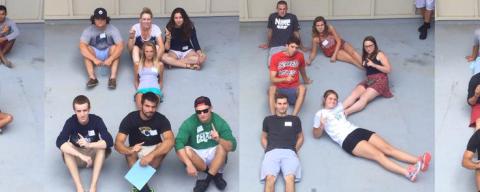Starting college is exciting – but also kind of scary! FIRE makes sure you dive into our community and feel supported your entire first year.
Our groundbreaking first-year research and innovation experience – widely known as FIRE – is a year-long, game-like experience that encourages you to become immediately involved in campus life alongside a small team of other first-year students. Through FIRE, students said they developed a better understanding of:
- Life at UNH and Paul College
- Practical skills needed to succeed as a college student – and beyond
- The importance of mentorship and the value of our community
- How to be a part of an effective team
- Academic support services to help explore potential majors and minors
- Career resources to help identify internship opportunities and fields of interest
- How to present a business plan and the corresponding research
Our ultimate hope? To offer you a soft landing at Paul College and UNH as well as extra opportunities to form lifelong friendships.
The Mentorship Component
The core of the FIRE program is the direct connections made between first-year students and upperclass student advisors. Each FIRE team is led by a Paul College student who has already completed their first year – often junior and senior students who are well-established at the college. They know exactly what it's like to be new on campus: settling into college life, trying to make friends, adjusting to a new level of academics, and so much more.
Once a week, FIRE teams meet with their Peer Advisors to tackle any issues they might be facing and learn about resources and skills that help the transition to UNH. Advisors organize outings, lead academic challenge projects, and help each student construct a realistic course schedule and academic plan at Paul. As students themselves, Peer Advisors offer an authentic connection to UNH and an honest student perspective to their first-year charges.
Each team is also matched with an alumni mentor who helps them develop important professional skills like resume writing, networking, and communication. Alumni mentors tend to be recent graduates of Paul College, with careers spanning a variety of industries. They also serve as advisors to the program's grand challenge and help teams review and polish their final presentations.

The Game Component
FIRE's game framework helps teams establish an identity and keeps students engaged throughout the year-long experience.
With the weekly help and guidance of your Peer Advisor, you’ll participate in a series of healthy competitions designed to introduce you to signature events, fun clubs, practical college life skills, and useful campus resources. Students earn points for their FIRE teams by participating in everything from sporting events to study sessions with their teammates. The program also hosts various mini-games and life skill competitions.
Essentially, the game component of FIRE incentivizes experiencing student life. The ultimate goal is to get involved on campus while also making friends. Both teams and individuals are rewarded with prizes for participation and high achievement at checkpoints throughout the year.

The Grand Challenge
At the beginning of FIRE each student team is tasked to problem solve a real world issue. Teams then break into smaller groups to tackle four different aspects of researching those issues: social, political, environmental, and scientific/technological.
Come spring, teams are once again broken into smaller groups to take on one of four stages in developing and presenting a business plan: research and literature review, written business plan, poster presentation, and oral presentation. These plans are ultimately presented at one of the largest undergraduate research conferences in the country – UNH's URC. They are all judged by a panel of faculty, peers and alumni, and each member of the overall winning team will receive a $500 academic achievement prize.
The Grand Challenge helps students experience a long-term project centered on extensive problem solving and skill development.
During COVID-19 the Paul College URC was held virtually. This offers us the unique opportunity to show you some of our past FIRE Grand Challenge Proposals.
Get Involved
The Igniters are the student advisory board for FIRE, comprised of one member from each of the 30 FIRE teams. Each Igniter is nominated by their peer advisor for being an exemplary member of their team. The group meets bi-weekly to give feedback on the program and to provide a first-year student perspective. They also act as an additional resource for their teams, motivating their peers to stay involved in the program.
Igniters help create and implement programming within the FIRE Program. FIRE's program coordinators plan professional development and leadership building opportunities around the Igniters' interests. Igniters help to implement those skills with their FIRE teams and take initiative to help with team building and programming.
Our peer advisors help ease student transition to Paul College, UNH, and college in general. Each advisor leads a single FIRE team throughout the entire academic year, meeting weekly to teach them important college life skills, help with their research project, and motivate them to continue earning points as a team.
Peer Advisors must be able to commit at least five hours every week to the program for the entire academic year. This includes 1-2 morning meetings with FIRE program coordinators, an hour-long weekly meeting with your FIRE group, and individual preparation for those class sessions.
We are looking for students who:
- Enjoy working with first year students, both individually and in group settings, with genuine concern for their academic and personal welfare.
- Feel comfortable leading group discussions and encouraging individual participation
- Will challenge students to always put forth their best effort and approach/support students who may not be doing their best.
- Have an authentic love for and loyalty to UNH and Paul College
- Are excited at the prospect of representing the school and acting in the dual role of mentor and peer
Other responsibilities include but are not limited to:
- Checking email daily and responding to requests from Director, Assistant Director, or Program Coordinator within 24 hours
- Regularly recording notes in MyWildcat Success (student online folder)
- Accurately tracking attendance/participation at all FIRE group meetings
- Participation in Paul’s Accepted Students Visit Day in the spring – as well as other occasional events
- Signing off as students’ academic advisor at pre-registration time: this means making sure the courses chosen by each individual student in your group are appropriate to their major and academic situation
- To be familiar with the resources and materials utilized in Paul’s academic advising; i.e. degree requirements, policies, handouts, the undergraduate catalogue, the student handbook, etc.
- To be familiar with University regulations and procedures of concerns to students; i.e., pre registration procedures, graduation requirements, and course prerequisites
- To be familiar with University regulations and procedures of concerns to students and be able to refer first year students with special problems to the appropriate office.
Our alumni mentors help mold and shape our youngest students. They teach basic skills, help students construct a career vision, and become that first step towards understanding the power of networking in the business world. Having an alumni mentor as a first-year student helps reduce the “perceived risk” of reaching out to a UNH alum for professional advice or to network. Your unique insights into Paul College and the working world could help provide a great first-year experience for business students at Paul and UNH.
Expectations:
- Interest in mentoring first-year students
- Monthly phone call with assigned peer advisor
- Monthly interaction with team, preferably on campus and in class
- Monthly contact with the FIRE Program Coordinator via email or phone
If you'd like to get involved with FIRE, contact Saege Robinson at Saege.Robinson@unh.edu











